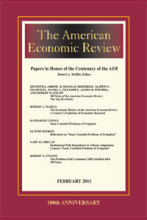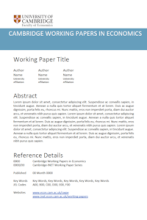We analyse data on managers in a large chain of food and drink stores in order to shed light on some fundamental questions about human behaviour.
In this firm, managers face a high-powered tournament incentive scheme, which provides a rich research opportunity. Somewhat uniquely, we are able to combine observational data on managerial performance at the firm with the data on characteristics and behaviours of these managers we collected through laboratory experiments with them.
Persistent Overconfidence and Biased Memory: Evidence from Managers
Persistent Overconfidence and Biased Memory: Evidence from Managers, David Huffman, Collin Raymond and Julia Shvets, American Economic Review, Vol. 112 pp. 3141-3175 (2022)
A long-standing puzzle is how overconfidence can persist in settings characterized by repeated feedback. This paper studies managers who participate repeatedly in a high-powered tournament incentive system, learning relative performance each time. Using reduced form and structural methods we find that: (i) managers make overconfident predictions about future performance; (ii) managers have overly-positive memories of past performance; (iii) the two phenomena are linked at an individual level. Our results are consistent with models of motivated beliefs in which individuals are motivated to distort memories of feedback and preserve unrealistic expectations.
Rank vs Money: Evidence from Managers
Rank vs Money: Evidence from Managers, Collin Raymond and Julia Shvets, Cambridge Working Papers in Economics (2022)
We study the existence and relative importance of status concerns compared to financial incentives among managers in a large firm where the bonus is determined through a high powered tournament. Using detailed data about both performance and labour input decisions, we consider managers' response to feedback about their rank as well as monetary bonuses. We find that managers exhibit rank concerns that are distinct from, but co-exist with, financial performance incentives. These rank concerns are important: moving from the bottom to the top of the firm's ranking is worth up to $4,500 a year to the average manager, or 48% of their annual performance bonus. Moreover, managers exhibit desire to catch up (i.e., utility is concave in rank): when managers get a bad rank they respond by improving performance, rather than getting discouraged. Our data allow us to identify these effects using both outputs (performance) as well as inputs (staffing decisions) of the managers.





